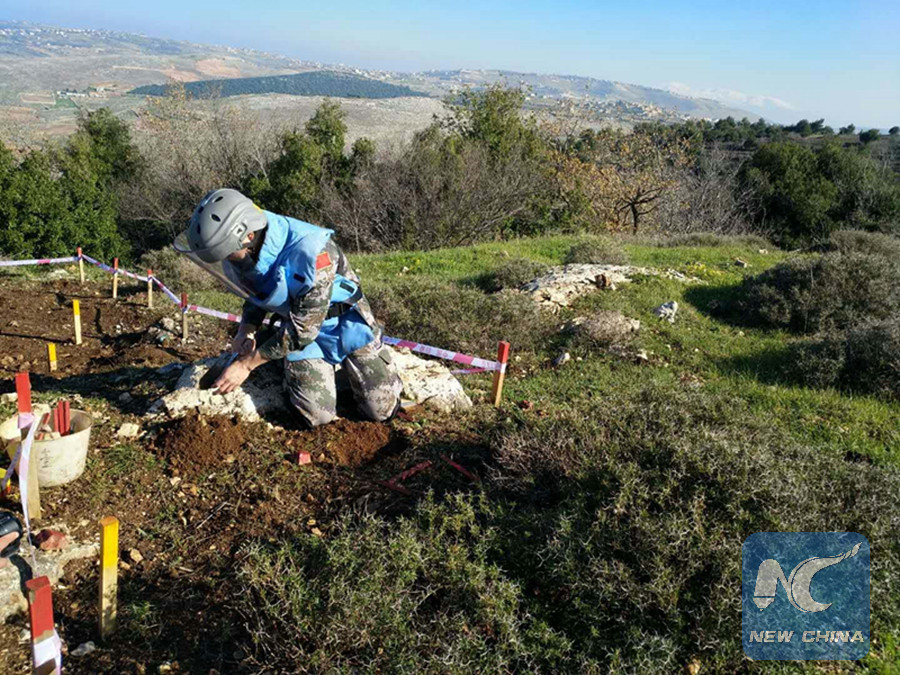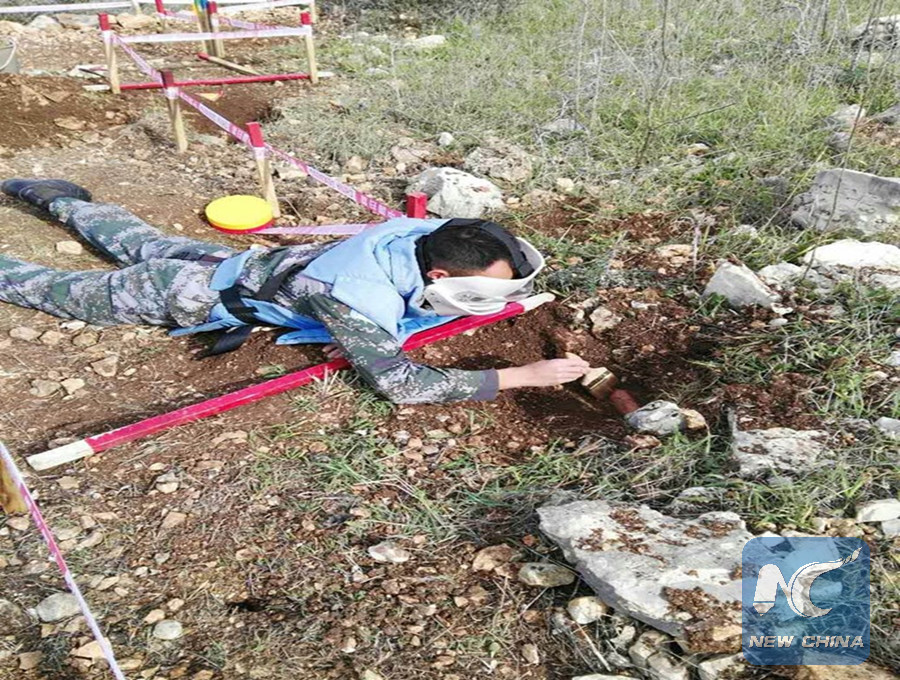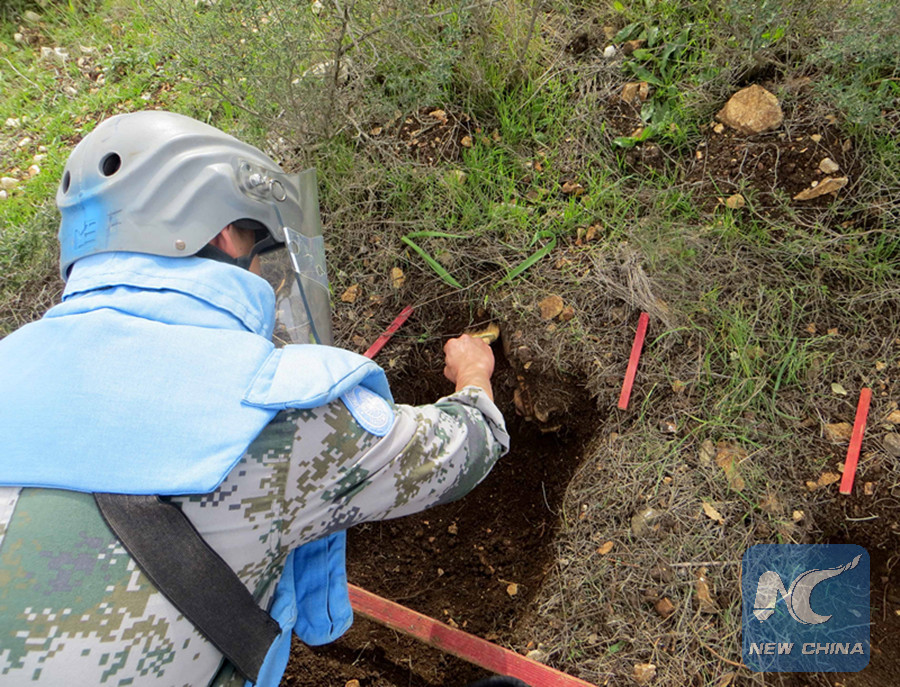
A Chinese peacekeeper in the UN Interim Force in Lebanon (UNIFIL) was searching for idle mines scattered along the UN Blue Line between Israel and Lebanon on Feb. 5, 2018. (Xinhua)
YAROUN, Lebanon, Feb. 11 (Xinhua) -- Over 6,000 kilometers away from his home and family, 25-year-old Li Junying waked up at 6 a.m. in southern Lebanon and prepared to search for idle mines scattered along the United Nations Blue Line.
Unable to speak a word of Arabic, Li has no personal connection to the small Levantine country or its contentious neighbor Israel. Nonetheless, he is one of more than 400 members of the Chinese military deployed as UN peacekeepers responsible for overseeing calm in the sensitive area by the Mediterranean sea.
Officially known as the United Nations Interim Force in Lebanon, UNIFIL was established by the UN Security Council on March 19, 1978 to oversee the withdrawal of the Israeli occupation of southern Lebanon. The international peacekeeping presence is deployed near the UN demarcated "Blue Line" separating the two countries.
Following three more Israeli invasions in 1982, 2000 and finally 2006, UNIFIL updated its mandate significantly increasing the number of peacekeepers and their responsibilities in the conflict zone.
The Chinese battalion of UN peacekeepers (CHINBATT) were part of the expansions, officially establishing itself in Lebanon on March 31, 2006. While battalions used to rotate about every eight months, troops are now stationed a year in the foreign country before returning to their home.
As a representative of China in CHINBATT, Sergeant Li and about 60 other men (some only 22-year-old) are tasked specifically to disarm over half a million mines left by Israel.
The majority of these fatal devices are densely packed along the southern border. Following the Israeli withdrawal in 2006, mines and cluster munitions have resulted in over 200 deaths and hundreds of more injuries.
"I was scared at first," Li admitted while recounting his first day in the field.
"Even though we were trained in China and (Lebanon), it's normal to be a little afraid. Everyone is at first, but there is a lot of supervision."
Despite his young age, Li is currently serving his second mission in southern Lebanon. He first arrived in 2013 when he was also tasked to clear the land of explosives.
Sitting next to him, 29-year-old Sergeant Jin Wei, who is on his third rotation in Lebanon, nodded his head.
"My parents were worried when I told them what I was doing," Jin told Xinhua.
"But we work very carefully and don't make mistakes."
Lieutenant Colonel Luo Qiang, the head supervisor of CHINBATT's demining team laughed in agreement.
"The Chinese are special," he said proudly noting CHINBATT's clear record of any accidents and injuries since the beginning of their work in 2006.
"We work professionally and we never make mistakes."
 A Chinese peacekeeper in the UNIFIL discovered a mine buried underground along the UN Blue Line between Israel and Lebanon, on Feb. 5, 2018. (Xinhua)
A Chinese peacekeeper in the UNIFIL discovered a mine buried underground along the UN Blue Line between Israel and Lebanon, on Feb. 5, 2018. (Xinhua)
Mohammad Rida, a member of the Lebanese Armed Forces tasked to work alongside CHINBATT agreed.
"The Chinese are extremely professional, they work hard and they do a good job."
The task is not easy, and requires meticulous attention to detail. According to maps provided by Israel, the peacekeepers are given rough locations on the whereabouts of mines. Yet weather elements, animals, and people are all capable of unintentionally moving their positions.
"This is why we don't work when it rains," Luo said. "It makes it dangerous when the soil gets wet and the mines can potentially slide around."
Waking up nearly at dawn, they drive to the site about an hour away from the CHINBATT base less than a kilometer away from Israel. Upon arrival, they begin working in sections using a range of tools including larger mine detectors, hand shovels and small brushes to clear away dirt, stones and shrubbery in the area.
After mines are discovered in each section, CHINBATT then informs higher supervisors in UNIFIL who communicate with both the Lebanese Armed Forces and Israeli Army to inform them of planned explosions.
Once approval is received, TNT explosives are wired to each area with found mines and carefully exploded to deactivate the device.
"The work we do is difficult. It requires such precise attention and it is dangerous, but we are honored to be granted such a task and represent China in doing so," Luo told Xinhua.
 A Chinese peacekeeper in the UNIFIL was carefully clearing the dirt covering a land mine planted along the UN Blue Line between Israel and Lebanon, on Feb. 5, 2018. (Xinhua)
A Chinese peacekeeper in the UNIFIL was carefully clearing the dirt covering a land mine planted along the UN Blue Line between Israel and Lebanon, on Feb. 5, 2018. (Xinhua)
UNIFIL Head of Mission and Force Commander Major General Michael Beary commended the contingent their progress and dedication in a visit to the site.
"The Blue Line is such a sensitive issue to both countries, and it's a strategic issue. And your work is helping to ensure that it doesn't become tense and that we can use the Blue Line as a reference. So everything you do is important. It's very valuable work. I really am proud of what you do here," he said during the visit according to a UNIFIL press release.
While demining is arguably the most important task assigned to the Chinese, it is far from the only activities they are responsible for completing on their mission. Other peacekeepers in the battalion are assigned humanitarian work and construction projects. Such efforts have included providing medical assistance and building roads for local residents.
Such responsibilities so far from home also come with their sacrifices. For the hundreds of peacekeepers, the year spent abroad far from home brings loneliness. Luckily, in the age of the internet, communication is only prevented by the time difference.
While on break, the CHINBATT members could be seen talking to family members over chat app WeChat, waving to children and wives across the ocean.
"When I go home, the first thing I do is see my children and wife," Luo Qiang said smiling. "And of course, I eat my favorite Chinese foods."

